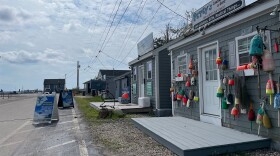An overflow crowd of anglers piled into the state’s Fish and Game Department headquarters Tuesday night in Concord to express concerns about proposed regulatory changes to fishing in New Hampshire.
The proposed rules, which are still being adjusted and will ultimately require approval by lawmakers, could potentially reduce the number of ponds and streams that are currently limited to fly fishing, change fishing season start and end dates, and allow fishermen to keep more of the fish they catch on certain bodies of water.
Fish and Game officials say such changes are necessary to streamline the state’s fishing regulations and better manage the pressure that more than 150,000 licensed anglers in New Hampshire put on water bodies that also face threats from warming weather conditions.
But speaker after speaker at Tuesday’s hearing said the proposals currently published on Fish and Game’s website risk harming the industry and the very populations of fish that regulators seek to protect. Some also argued that the state hasn’t shared the science it says it is relying on to guide its new proposals.
At Tuesday’s public hearing, state officials said they want input from New Hampshire’s anglers in crafting any reforms.
“Help us out,” Dianne Timmins, head of the state’s inland fisheries program, told those in attendance before the start of the hearing. She described the meeting as an opportunity for fishermen “to actually be a part of our program.”
Sensing the tension in the room, Timmins also joked that she hoped nobody “pithed” her on the way out the door, referring to the practice of killing or immobilizing animals with a rod or needle.
There was no pithing, but there was plenty of carping about the new rules.
Under the initial draft of the proposal, the number of trout ponds in New Hampshire that are currently designated as “fly fishing only” would drop from 29 to 5. In addition, all stretches of river that are currently limited to fly fishing would be opened up to the use of artificial lures and spinning reels.
Fishing season opening dates for some bodies of water would shift from the end of April to April 1. But the last day of the trout fishing season would also be moved up on some rivers from October 15 to September 30, and an end date of Labor Day for some ponds.
“Where’s the simplification in having all these changing closing dates?” asked Steve Angers, who owns North Country Angler, a fly shop in North Conway that’s been in operation for 55 years.
Angers said losing Columbus Day weekend for fishing on some water bodies would have an immediate impact on not only his business, but also on the lodges, guides and restaurants in the region that cater to angler tourism.
“So there is a whole economic hit that those of us in the Mount Washington Valley to the border will take by the season closing on the 30th of September,” he said.
Angers said his biggest concern about the proposals isn’t the new season end date, but the proposed change to “catch and release” designated waters, including three ponds and a stretch of the Androscoggin River near the Maine border that he said can produce memory-making catches.
By allowing anglers to keep what they catch — even just two per person per day — Angers said it ultimately diminishes the chance of catching larger fish for everyone.
“Ultimately what happens is, now that the 20-inch fish, or the 10 pound fish, are gone, people start to keep the 18-inch fish. And then they keep the 16-inch fish, and then the 14-inch fish,” he said. “And now you’ve destroyed a fishery.”
In an interview Wednesday, Timmins said that the entire slate of proposed regulations are still under active review. She stressed that any changes to the management of the state’s ponds and rivers will be based on both biology and the input that regulators receive from the fishermen they want to work with.
“We will use the feedback to shape the proposal,” said Timmins.
During Tuesday’s public hearing, she said that the state is relying on data to better manage trout ponds and rivers. She also said that existing regulations and approaches to fish management are out of date, given the continued growth of the sport and the impact of climate change on water bodies.
“We're basically trying to look at science, and then utilize the water bodies that we can, and the best way that that water body has for capacity,” she said.
She cited an increase in large storms and warming bodies of water as putting pressure on the fish populations, making it harder to manage ecosystems that are heavily fished, or rely on large scale fish stocking programs.
For many of the fly fishermen at Tuesday’s meeting, sharing rivers and ponds with anglers who use spinning reels and artificial lures is more than a nuisance: They see it as a threat to treasured waterways in the state’s North Country, including the Connecticut River in Pittsburg.
“Taking the 'fly fishing only' area that is the gem of the state and opening it up is the wrong thing to do,” said Eric Turcotte of Lee during Tuesday’s input session. “It is a sanctuary for fly fishermen.”
Other anglers spoke of how crowded current rivers that are only open to fly fishing can become during the relatively short season. Adding more types of fishing, they said, would only further diminish the experience.
Another public input session is scheduled for Wednesday evening in Lancaster, and written comments will be accepted through Sept. 6. Once a set of formal regulations are crafted, the public will be given another opportunity to make comments before the plans are ultimately placed in the hands of a legislative committee that will make an up or down decision.





